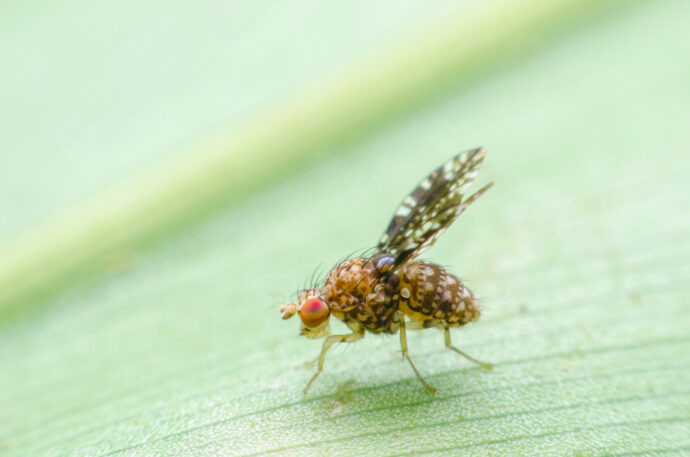Fruit flies, those tiny, buzzing insects that seem to materialize out of thin air around your fruit bowl, are a common household nuisance. You’ve likely seen them hovering around overripe bananas or noticed them near your kitchen sink, and perhaps wondered about the health risks they pose. Many people worry: can fruit flies actually make you sick?
It’s a valid concern. These little flies frequent less-than-hygienic places, raising questions about whether they carry diseases or contaminate our food. Let’s delve into the science to understand the real risks, if any, associated with fruit flies and your health.
Understanding Fruit Flies: Where Do They Come From?
Fruit flies, scientifically known as Drosophilidae, are also commonly called fruit gnats or vinegar flies. They are small insects that are particularly attracted to fermenting fruits and vegetables. You’ll often find them swarming around overripe produce, but they can also be found near garbage cans, drains, and anywhere there’s decaying organic matter.
 Close-up of a fruit fly with patterned wings and red eyes on a green leaf
Close-up of a fruit fly with patterned wings and red eyes on a green leaf
Fruit flies are prolific breeders. A few flies can quickly turn into a full-blown infestation if they find a suitable breeding ground. Their rapid life cycle means that a small issue can escalate quickly if not addressed.
Do Fruit Flies Bite or Sting?
Rest assured, fruit flies are not equipped to bite humans. They lack the mouthparts necessary to pierce skin and feed on blood. Their mouthparts are designed for lapping up liquids, particularly the sugary substances found in rotting fruit. So, biting or stinging is not a concern with these tiny insects.
Fruit Flies and Bacteria: Are They Carriers of Disease?
While fruit flies themselves are not directly linked to specific diseases in humans, they can be vectors for bacteria. This means they can pick up microorganisms from unclean surfaces and transfer them to other areas, including your food. Studies have shown that fruit flies can carry bacteria like Salmonella, E. coli, and Listeria, which are known to cause foodborne illnesses.
The concern arises because fruit flies are attracted to decaying matter, garbage, and other unsanitary locations where these bacteria thrive. They can then land on your fruits and vegetables, potentially depositing these harmful microorganisms. This is particularly relevant in environments where hygiene may be lacking, or food is left exposed.
So, Can Fruit Flies Actually Make You Sick?
Despite the potential for carrying bacteria, the direct link between fruit flies and human illness is less straightforward than you might think. Accidentally ingesting a fruit fly or eating food that a fruit fly has landed on is unlikely to directly cause illness. Your stomach acid is generally effective at killing any bacteria that might be present.
The real risk comes from the spoiled food itself. Rotting fruits and vegetables are breeding grounds for bacteria and mold, and these are the primary culprits behind foodborne illnesses, not the fruit flies themselves. Fruit flies are more of an indicator of unsanitary conditions and decaying food rather than the direct cause of sickness. Therefore, while fruit flies are unhygienic and can carry bacteria, they are not typically considered a direct health hazard in terms of causing disease through ingestion.
Addressing Patient Concerns and Misinformation
The presence of fruit flies can understandably cause concern, especially for parents worried about their children’s health. Misinformation can easily spread, leading to unnecessary anxiety about these pests. It’s important to reassure individuals that fruit flies are primarily a nuisance and not a major health threat in themselves.
The focus should be on addressing the underlying issues that attract fruit flies – spoiled food and unsanitary conditions. Effective fruit fly control and good hygiene practices are key to minimizing their presence and any associated risks, however minimal they may be.
What Attracts Fruit Flies: Their Food Sources
Understanding what fruit flies eat is crucial for preventing infestations. Their diet mainly consists of:
- Overripe and fermenting fruits and vegetables
- Rotting food scraps and garbage
- Fermented liquids like vinegar, beer, and wine
- Sugary spills and residues
- Moist organic matter, including damp drains and garbage disposals
By eliminating these food sources, you can significantly reduce fruit fly populations in your home.
Effective Ways to Get Rid of Fruit Flies
Getting rid of fruit flies requires targeting their breeding grounds and food sources. Here are some proven methods:
- Apple Cider Vinegar Trap: Pour apple cider vinegar into a bowl, cover it with plastic wrap, and poke small holes in the top. Fruit flies are attracted to the vinegar and will get trapped inside.
- Eliminate Overripe Produce: Discard overripe fruits and vegetables promptly. Store fresh produce in the refrigerator.
- Clean Spills and Residues: Immediately clean up any spills, especially sugary or fermented liquids.
- Clean Drains and Garbage Disposals: Regularly clean drains and garbage disposals to remove decaying organic matter.
- Sticky Traps: Use commercially available sticky traps to catch adult fruit flies and reduce their numbers.
- Keep Trash Cans Clean and Covered: Ensure trash cans are tightly closed and emptied regularly.
 Person inspecting kitchen counter for fruit flies
Person inspecting kitchen counter for fruit flies
Is There Treatment Needed if You Ingest Fruit Flies?
No specific medical treatment is necessary if you accidentally ingest fruit flies or eat food they have been on. As mentioned, fruit flies themselves are not poisonous or directly disease-causing in this way. If you develop gastrointestinal symptoms, it’s more likely due to the spoiled food itself or other pathogens, rather than the fruit flies. In such cases, treatment should focus on managing the symptoms of foodborne illness, not specifically targeting fruit fly ingestion. It’s always best to consult a healthcare professional if you are concerned about symptoms after potential food contamination.
In Conclusion
While fruit flies are undeniably annoying and can be unhygienic, the risk of them directly making you sick is low. They are more of an indicator of unsanitary conditions and the presence of rotting food, which are the real culprits behind potential health issues. Focusing on good hygiene, proper food storage, and effective fruit fly control methods is the best approach to minimizing their presence and maintaining a healthy home environment.
Sources:
Analysis of Seasonal Risk for Importation of the Mediterranean Fruit Fly, Ceratitis capitata (Diptera: Tephritidae), via Air Passenger Traffic Arriving in Florida and California, Szyniszewska AM, Leppla NC, Huang Z, Tatem AJ, J Econ Entomol. 2016 Sep 4. pii: tow196
Bio
Heidi Moawad MD, author of Careers Beyond Clinical Medicine, is a neurologist and a medical writer. Dr. Moawad currently sees patients in the telemedicine setting and teaches human physiology and global health at John Carroll University in Cleveland, Ohio. An active member of the American Academy of Neurology, Heidi Moawad is on the payment policy committee of the American Academy of Neurology, has written peer reviewed articles, is on the Editorial Board of Neurology Clinical Practice and regularly contributes to several online health websites, including about.com. Dr. Moawad has experience as a clinical neurologist and as a consultant in the health insurance industry.
Dr. Heidi Moawad is a graduate of Case Western Reserve University School of Medicine and trained at Northwestern Evanston Hospital in Evanston, Illinois in Internal Medicine internship and University of Chicago Hospital in Chicago, Illinois in Neurology.
